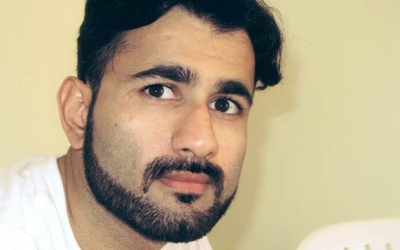Guantanamo Bay detainee sues US for imprisonment beyond scheduled release

A Guantanamo detainee that completed a 10-year-sentence at the notorious detention centre has filed a federal suit against the US for keeping him in custody months after his scheduled release.
Lawyers for Majid Khan, a Maryland resident who admitted to being an al-Qaeda courier, filed the habeas petition on his behalf in a federal court in Washington, arguing that the US has an obligation to resettle him somewhere, based on his cooperation with authorities.
In 2012, Khan pleaded guilty to multiple charges and agreed to cooperate with authorities in other investigations, including the case against the five men being held at Guantanamo who are charged with planning and providing logistical support for the 9/11 attacks.
He was issued a 26-year sentence which was mostly symbolic, given the plea agreement and his time already served. He was due for release on 1 March.
"The government's failure to transfer Majid after serving his sentence makes the military commissions system utterly pointless," Katya Jestin, co-managing partner at Jenner & Block and one of Khan's lawyers, said in a statement.
"Why have a trial and sentencing, let alone plead guilty and cooperate with the United States, if you aren't released at the end of your sentence? It's a failure of policy and may have larger programmatic consequences for the government.”
Khan, 41, became the first former prisoner of the CIA's clandestine overseas prison network to openly testify about his treatment there. He says he was waterboarded, sexually abused, suspended naked from a ceiling beam for long periods, and subject to sleep deprivation for days.
"I thought I was going to die," he told the jury last year.
'Guantanamo's cruel absurdity'
Khan immigrated to the US with his family in the 1990s, graduated from a Baltimore suburb high school and held a telecommunications job in the Washington DC area.
In 2002, during a family trip to Pakistan, he encountered relatives with ties to al-Qaeda and admitted he "went willingly" to the militant group.
After being captured in 2003, he was transferred to a number of CIA black sites before he was sent to the Guantanamo Bay prison in 2006 for trial. In 2012, he pleaded guilty to charges that included conspiracy, murder and providing material support to terrorism.
The sentencing was the most recent case in the slow-moving military commissions process at Guantanamo Bay, where two out of the nearly 800 people sent to the prison were convicted, while another 10 are awaiting trial.
Khan's continued detention is a sign of the prison's longevity, with Biden's promise to close the prison being held back by the more than 30 detainees that remain in the prison to this day.
"Mr Khan's situation is a perfect example of Guantanamo’s cruel absurdity - he accepted his punishment and served his time, but is now worse off than he had been because not only is he still there, but also some in the government apparently think he doesn’t need to talk to his lawyers anymore now that his criminal case is finished," Scott Roehm, director of the Centre for Victims of Torture (CVT), told MEE in a statement.
Yumna Rizvi, a policy analyst at CVT, told MEE: "It is outrageous that the government continues to detain Majid Khan, who cooperated with the government for 10 years, pled guilty, and whose sentence ended three months ago.
"The military jury at his sentencing hearing wrote what happened to him was a stain on the moral fiber of the United States; so is continuing to hold him, while also apparently severely restricting his access to his lawyers."
Middle East Eye delivers independent and unrivalled coverage and analysis of the Middle East, North Africa and beyond. To learn more about republishing this content and the associated fees, please fill out this form. More about MEE can be found here.





